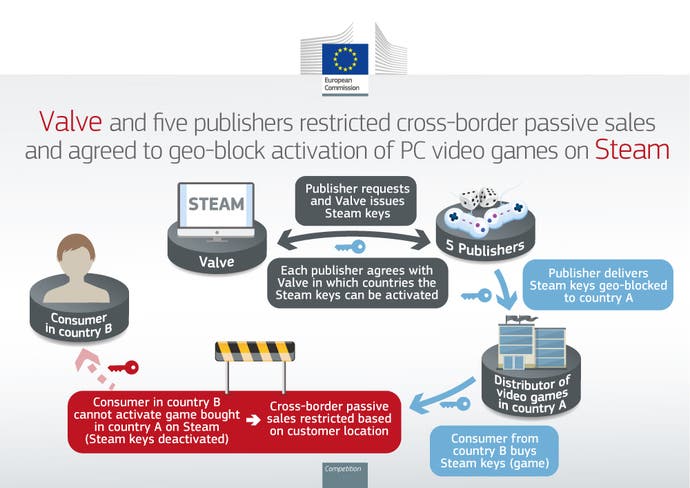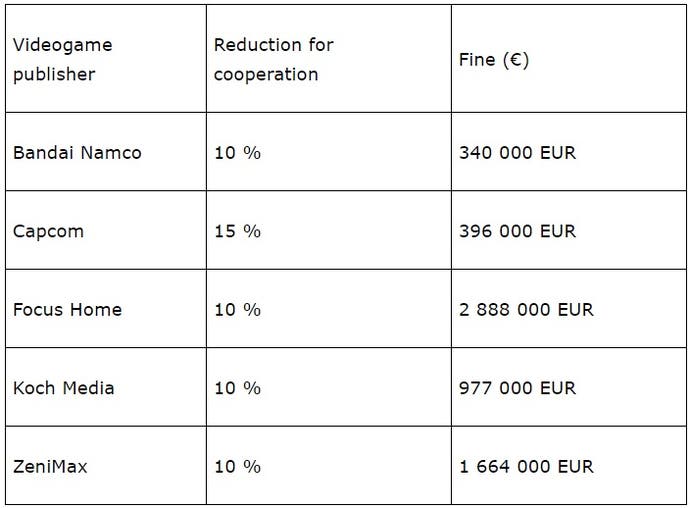European Commission fines Valve and five publishers €7.8m for geo-blocking Steam games
UPDATE: Valve insists it cooperated, plans to appeal.
UPDATE: Valve has issued Eurogamer with a statement disputing the European Commission's claims and vowing to appeal.
A Valve spokesperson told Eurogamer: "During the seven year investigation, Valve cooperated extensively with the European Commission ("EC"), providing evidence and information as requested. However, Valve declined to admit that it broke the law, as the EC demanded. Valve disagrees with the EC findings and the fine levied against Valve.
"The EC's charges do not relate to the sale of PC games on Steam - Valve's PC gaming service. Instead the EC alleges that Valve enabled geo-blocking by providing Steam activation keys and - upon the publishers' request - locking those keys to particular territories ("region locks") within the EEA. Such keys allow a customer to activate and play a game on Steam when the user has purchased it from a third-party reseller. Valve provides Steam activation keys free of charge and does not receive any share of the purchase price when a game is sold by third-party resellers (such as a retailer or other online store).
"The region locks only applied to a small number of game titles. Approximately just 3% of all games using Steam (and none of Valve's own games) at the time were subject to the contested region locks in the EEA. Valve believes that the EC's extension of liability to a platform provider in these circumstances is not supported by applicable law. Nonetheless, because of the EC's concerns, Valve actually turned off region locks within the EEA starting in 2015, unless those region locks were necessary for local legal requirements (such as German content laws) or geographic limits on where the Steam partner is licensed to distribute a game. The elimination of region locks may also cause publishers to raise prices in less affluent regions to avoid price arbitrage. There are no costs involved in sending activation keys from one country to another, and the activation key is all a user needs to activate and play a PC game."
We've asked the European Commission for a response.
ORIGINAL STORY: The European Commission has fined Valve and five publishers €7.8m for geo-blocking PC games.
Valve, Bandai Namco, Capcom, Focus Home, Koch Media and ZeniMax (Bethesda) were all fined for breaching EU antitrust rules.
The European Commission said the companies restricted cross-border sales of certain PC games on the basis of the geographical location of users within the European Economic Area (EEA), violating EU antitrust rules.
The Commission published a useful graphic, below, explaining what went on:

The fines were reduced for the publishers because they cooperated with the Commission.
Here's the breakdown:

The Commission said Valve refused to cooperate, and so slapped the US company with a heavier fine (€1.624m) than they would have otherwise. We've asked Valve for comment.
"Today's sanctions against the geo-blocking practices of Valve and five PC video game publishers serve as a reminder that under EU competition law, companies are prohibited from contractually restricting cross-border sales," said executive vice-president Margrethe Vestager, who is in charge of competition policy.
"Such practices deprive European consumers of the benefits of the EU Digital Single Market and of the opportunity to shop around for the most suitable offer in the EU."
It may get worse for the publishers - the Commission said any person or company affected by the anti-competitive behaviour described in this case may bring the matter before the courts of the member states and seek damages. In cases before national courts, a Commission decision constitutes binding proof that the behaviour took place and was illegal.


